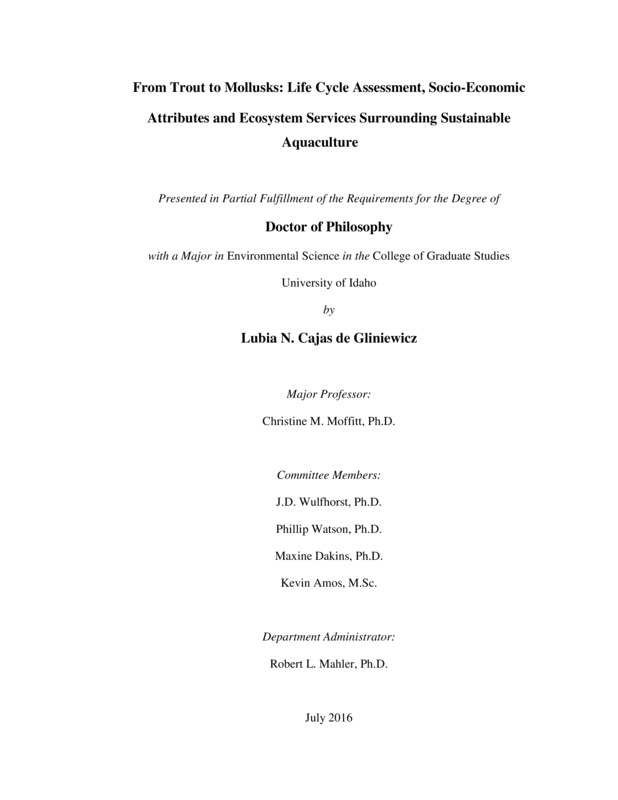From Trout to Mollusks: Life Cycle Assessment, Socio-Economic Attributes and Ecosystem Services Surrounding Sustainable Aquaculture
Cajas de Gliniewicz, Lubia Nohemi. (2016). From Trout to Mollusks: Life Cycle Assessment, Socio-Economic Attributes and Ecosystem Services Surrounding Sustainable Aquaculture. Theses and Dissertations Collection, University of Idaho Library Digital Collections. https://www.lib.uidaho.edu/digital/etd/items/cajasdegliniewicz_idaho_0089e_10852.html
- Title:
- From Trout to Mollusks: Life Cycle Assessment, Socio-Economic Attributes and Ecosystem Services Surrounding Sustainable Aquaculture
- Author:
- Cajas de Gliniewicz, Lubia Nohemi
- Date:
- 2016
- Embargo Remove Date:
- 2017-04-13
- Keywords:
- beef production footprint analysis Life Cycle Assessment sustainability trout and mussel aquaculture Virtual water
- Program:
- Environmental Science
- Subject Category:
- Environmental science; Water resources management; Environmental economics
- Abstract:
-
This dissertation uses economic, environmental, social and cultural criteria to address the sustainability of three food production systems. Virtual water content and land use of beef cattle and trout production system in Idaho, USA were estimated in Chapter 1. The estimates showed that most resources were allocated to feed production. On average, one kg of edible boneless beef required about 20,000 L of water in mixed systems and 1,060 m2 of land. This production was estimated to release about 24 kg of CO2 equivalents. The average water and land resources needed to produce one kg of boneless trout were estimated at 5,500 L and 4 m2, respectively. The trout production was estimated to release trace amounts of CO2 equivalents.
Chapter 2 and 3 were conducted as a case study of a marine mussel farm in Washington state, USA. An input-output economic model captured transactions from the mussel farm, and the results highlighted environmental attributes and simulated the potential value from increased domestic mussel production. The farm harvested 550,000 kg of live mussels/year that generated $1.33 in direct and indirect economic contributions for each dollar of final demand at farm gate within the state of Washington. If all expenses occurred within the USA, mussel farms could contribute $1.58 per dollar of demand from purchases within industrial sectors, excluding employee compensation, taxes and revenues. The case study estimated the water, land and carbon footprints, socio-economic attributes (e.g. demographics, income, job stability and safety) and cultural aspects of the domestic and global distribution, production, and processing of mussels. Fresh water use per kg of whole mussel cultured and processed at the farm was estimated at 73-94 L, based on the annual production of 550,000 kg. The carbon footprint was estimated at 1.85 kg of CO2e/kg of mussels (or 3.7 kg of CO2e/kg of edible mussel meat).
The results and review of the sustainability highlight potential benefits and risks of increasing domestic mussel production and consumption, boosting national economic and social stability. The potential future expansion for mussel production was placed within a framework of harvest, socio-economic factors, and protection of natural ecosystem services.
- Description:
- doctoral, Ph.D., Environmental Science -- University of Idaho - College of Graduate Studies, 2016
- Major Professor:
- Moffitt, Christine M
- Committee:
- Wulfhorst, J. D.; Watson, Phillip; Dakins, Maxine; Amos, Kevin
- Defense Date:
- 2016
- Identifier:
- CajasdeGliniewicz_idaho_0089E_10852
- Type:
- Text
- Format Original:
- Format:
- application/pdf
- Rights:
- In Copyright - Educational Use Permitted. For more information, please contact University of Idaho Library Special Collections and Archives Department at libspec@uidaho.edu.
- Standardized Rights:
- http://rightsstatements.org/vocab/InC-EDU/1.0/

